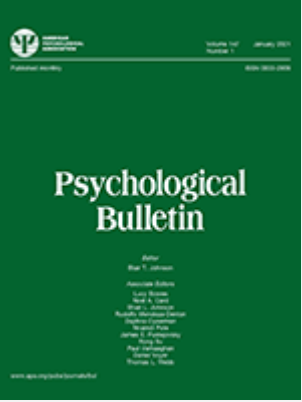The predictive power of autobiographical memory in shaping the mental health of young people: An individual participant data meta-analysis.
IF 19.8
1区 心理学
Q1 PSYCHOLOGY
引用次数: 0
Abstract
Reduced autobiographical memory (AM) specificity, characterized by difficulty recalling specific past events, is a feature of multiple psychiatric disorders. While meta-analyses indicate that reduced AM specificity can predict future symptom severity, its role as a premorbid risk factor for mental illness onset in young people remains unclear. Our preregistered individual participant data meta-analysis (PROSPERO; CRD42022287786) synthesized longitudinal data from 14 community-based studies of children and adolescents (N = 9,165). Most studies reported symptom severity (92.9%), with one third also reporting diagnostic status (35.7%). Assessment timing ranged from 2 months to 8.3 years following the autobiographical memory task. Multivariate mixed-effect models found no support for AM specificity predicting future symptom severity in depression or posttraumatic stress disorder. Contrary to expectations, higher memory specificity significantly predicted higher anxiety symptoms, but the quality of evidence was low. Intriguingly, reduced AM specificity significantly predicted an increased risk of receiving a psychiatric diagnosis and an earlier onset of disorder (hazard ratio = 0.55, p = .018). This risk was most robust for depressive disorders (hazard ratio = 0.21, p < .001). Findings suggest reduced AM specificity could be a risk factor for the onset of functionally impairing psychiatric disorders, but it does not consistently predict elevated symptoms in community-based samples. Further theoretical development is needed. (PsycInfo Database Record (c) 2025 APA, all rights reserved).自传式记忆在塑造年轻人心理健康方面的预测能力:个体参与者数据荟萃分析。
自传体记忆(AM)特异性降低,以难以回忆特定的过去事件为特征,是多种精神疾病的一个特征。虽然荟萃分析表明,AM特异性降低可以预测未来症状的严重程度,但其作为年轻人精神疾病发病前风险因素的作用尚不清楚。我们预先注册的个体参与者数据荟萃分析(PROSPERO;CRD42022287786)综合了14项基于社区的儿童和青少年研究的纵向数据(N = 9165)。大多数研究报告了症状严重程度(92.9%),其中三分之一还报告了诊断状态(35.7%)。评估时间从自传式记忆任务后的2个月到8.3年不等。多变量混合效应模型没有发现AM特异性预测抑郁症或创伤后应激障碍未来症状严重程度的支持。与预期相反,更高的记忆特异性显著预示着更高的焦虑症状,但证据质量较低。有趣的是,AM特异性降低显著预示着接受精神诊断的风险增加和疾病的早期发作(风险比= 0.55,p = 0.018)。这种风险在抑郁症中最为显著(风险比= 0.21,p < 0.001)。研究结果表明,AM特异性降低可能是功能损害性精神疾病发病的一个危险因素,但它并不能一致地预测社区样本中症状的升高。需要进一步的理论发展。(PsycInfo Database Record (c) 2025 APA,版权所有)。
本文章由计算机程序翻译,如有差异,请以英文原文为准。
求助全文
约1分钟内获得全文
求助全文
来源期刊

Psychological bulletin
医学-心理学
CiteScore
33.60
自引率
0.90%
发文量
21
期刊介绍:
Psychological Bulletin publishes syntheses of research in scientific psychology. Research syntheses seek to summarize past research by drawing overall conclusions from many separate investigations that address related or identical hypotheses.
A research synthesis typically presents the authors' assessments:
-of the state of knowledge concerning the relations of interest;
-of critical assessments of the strengths and weaknesses in past research;
-of important issues that research has left unresolved, thereby directing future research so it can yield a maximum amount of new information.
 求助内容:
求助内容: 应助结果提醒方式:
应助结果提醒方式:


